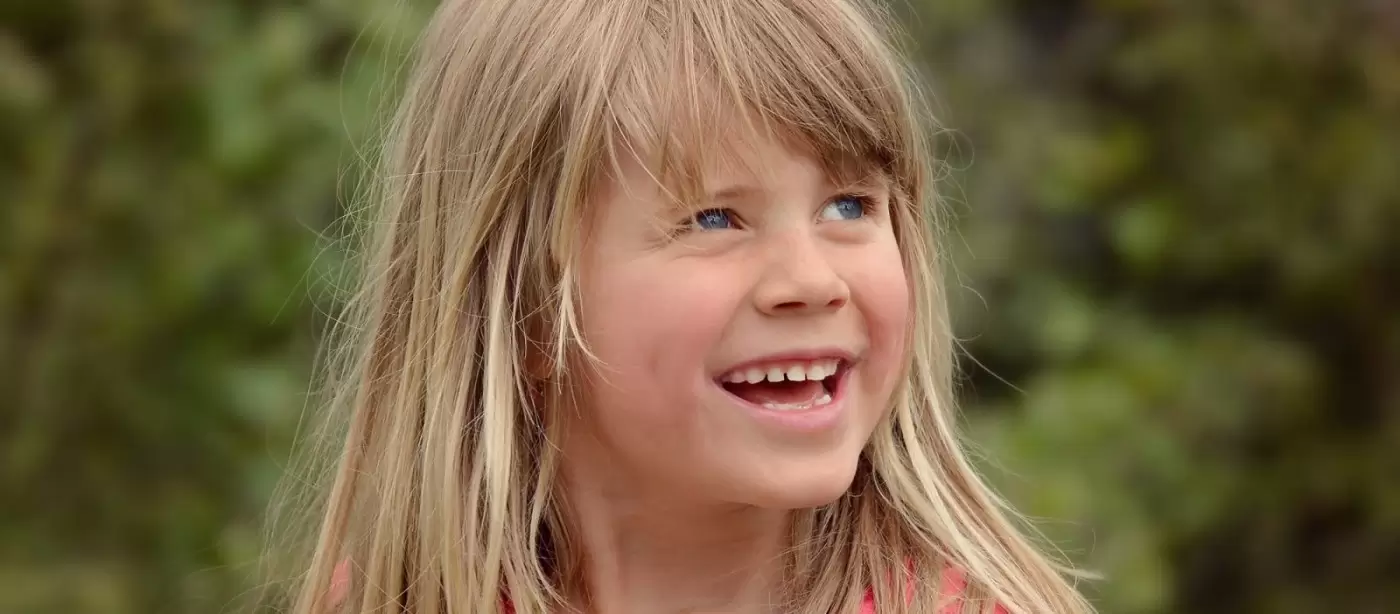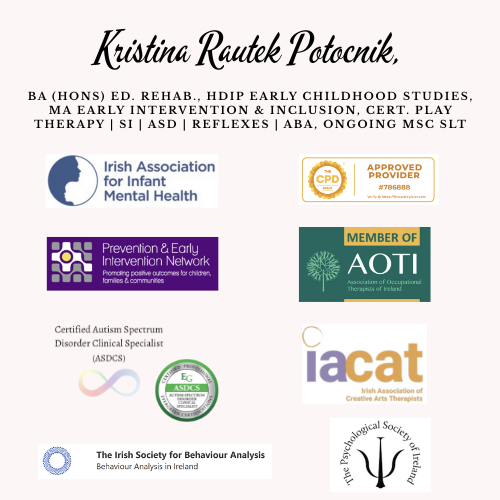Sweet Little Lies – How to Recognise Them and Respond with Care

Author: Kristina Rautek Potocnik, BA (Hons) Ed. Rehab., HDip Early Childhood Studies, MA Early Intervention & Inclusion, Cert. Play Therapy | SI | ASD | Reflexes, ongoing MSc SLT
Have you ever heard your child say something that isn’t quite true? Maybe they proudly tell friends they have a new puppy (even though they don’t), or they answer guests by saying you’re going to the seaside “this afternoon” – even if the trip is a month away. Sometimes, they even say another child pushed them when that didn’t happen. As a parent, you might feel confused or worried: Why is my child making up stories? Is this normal?
The good news is – yes, it’s completely normal.
Small lies often begin around the age of three. They are part of a child’s natural development. At this age, children do not yet fully understand the difference between imagination and reality. To them, stories feel real. They may say things that they wish were true or things they don’t want to be true. Their memory is also still developing, and they may mix up details or get confused about time. For example, a child might say something is happening “today” just because they want it to.
While most of these little lies are harmless and innocent, it’s still important for parents to respond gently, so lying doesn’t become a habit or a way for the child to avoid responsibility.
Why Do Children Tell Small Lies?
There are many reasons why children make up stories or avoid telling the truth. One common reason is fear of consequences. If they know they did something wrong – like breaking a toy or taking a sweet without asking – they might lie in hopes of “making the bad thing go away.” Sometimes, they might blame someone else to avoid getting in trouble and still look like the “good” child.
Other times, a child may not be lying at all – they may just understand time differently. For example, when you ask, “Did you brush your teeth?” and they say yes, it might mean they did it that morning – not just now.
Children may also lie to get attention or to feel special. They might say they went somewhere exciting when they didn’t, or that they have something they don’t – like a pet or a toy. This often shows a need for connection, confidence, or approval. It can also be a sign that they’re using imagination to make the world feel nicer. In some cases, children who feel lonely or unnoticed may tell more stories to make life seem better.
Instead of reacting with anger, try to listen with curiosity. What is your child trying to say with this story? What do they really need?
How to Recognise a Little Lie
Children may show physical signs when they are not telling the truth. They might look down, avoid eye contact, or say “I don’t know” when asked about something they clearly did – like the broken vase. Some might touch their face, rub their nose, or scratch their head while speaking. But be careful – these signs don’t always mean a child is lying. They could simply be nervous or distracted.
What Should Parents Do?
When your child says something untrue, try to stay calm and speak gently. Instead of accusing or getting angry, name the situation. For example, if they say they didn’t eat the cookie but have chocolate on their face, say:
"I see you ate the cookie before lunch. We agreed to eat sweets after lunch."
This helps them understand the truth without feeling ashamed.
Avoid asking too many questions like “Did you do this?” when you already know the answer. Children may lie more if they feel scared or worried about punishment. Instead, state what you noticed:
"I saw the markers on the wall. Let’s talk about what happened."
Sometimes children lie about something they wish were true. If your child says, “Today is my birthday!” when it’s not, you can respond warmly:
"You wish today was your birthday. That sounds fun – cake and presents!"
This shows you understand their wish, while gently returning them to reality.
It’s also important not to label your child as a liar, laugh at their stories, or make them feel embarrassed. If lying gets a big reaction – whether angry or funny – they might repeat it to get your attention.
Be a good example. Try not to lie in front of your child. Even small things like saying, “Tell them I’m not home” when you are, can send the message that lying is okay.
And if you can’t keep a promise – like going to the cinema after work – explain it honestly:
"I know I promised the cinema, but I’m very tired today. I’m sorry. Let’s plan a new day."
This teaches your child that everyone makes mistakes, and being honest is part of being responsible.
If your child admits a mistake, don’t remove all consequences, but work together to fix it. This builds trust and responsibility. Most importantly, praise honesty – especially when it’s hard for them to tell the truth.
Children’s imaginations are beautiful. Listen to their stories. With gentle guidance, small lies can become chances for learning, bonding, and growing.
Latest Posts
- How children make sense of the world through their senses
- How your baby learns about the world through their senses
- Helping your child grow stronger through movement and play
- Understanding How Early Intervention Helps Children Learn, Move, and Connect
- How to Recognise Tactile Defensiveness and Help Your Child Feel Safe
- Understanding Feeding Challenges and How to Support Your Child at Home
- Let’s Talk Sitting: Exploring Floor Seating Options
- Retained Primitive Reflexes: The Hidden Cause Behind Developmental Struggles
- Where Curiosity Blossoms: How Children's Play Nurtures Growth for All
- Helping Your Child Through Stress: A Gentle Guide for Parents
- Sweet Little Lies – How to Recognise and Respond with Care
- Chores Are More Than Just Tasks – They’re a Tool for Growing Independence, Focus, and Confidence
- How to Help Children Develop Emotional Intelligence
- Blending Technology and Care: How VR Meta Quest Supports Children at NeuroNest
- A simple guide for parents who want to raise confident, happy children
- Setting Boundaries with Love: A Simple 3-Step Guide for Parents
- Understanding Behavior Through the Nervous System
- A Compassionate Lens on Dysregulation in Non-Speaking Autistic Individuals
- Supporting Development Through Movement: The Role of the Swing in Early Intervention
- Blending Tradition and Innovation: How NeuroNest Supports Your Child’s Unique Journey
- When Movement Meets Innovation: Supporting Child Development with GoBalance
- Why Visual Perception Matters for Everyday Life and Development
- Benefits of Chess in Early Intervention
- Building Healthy Nutrition from the Start
- A Journey Back to Your True Self
- Supporting Your Child’s Hand Skills for Confident Writing
- Blending the Best of Both Worlds
- Helping Toddlers Eat Well: A Parent’s Guide
- Why Tummy Time Matters for Your Baby's Development
- Helping Your Child Build Everyday Independence
- Who Are the Disconnected Kids?
- From First Tries to Automatic Habits: Understanding the Stages of Skill Learning
- Why a Child’s Level of Alertness Matters for Memory and Learning
- Early brain development starts before birth
- Why Slowing Down, Adapting Tasks, and Adding Breaks Helps Children Learn Better
- Why ADHD, Autism, Dyslexia and Other Challenges Need a New Approach
- The surprising power of copying in child development
- Books are more than just language tools—they’re powerful allies in sensory and motor development.
- Rethinking sensory support: moving beyond expensive rooms toward everyday understanding.
- Understanding how fear develops in a child’s brain
- Understanding how an early baby reflex can affect your child’s daily life
- A gentle start into baby development through movement and bonding
Our Partners



Our Memberships


